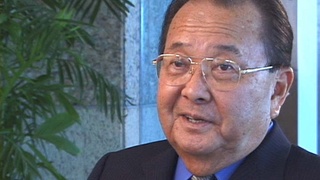Entrevistas
Finding out Roosevelt wanted Japan to attack
Looking back right now, I’m finding out right now that Roosevelt at that time told Dutch not to sell oil to the Japanese. And this latest book that came out, a book about…this guy Beverly, made a research, just came out just a couple of years ago, and found out that Roosevelt, being a wise president, wanted to help England. England was almost losing the war, and he said if whole of Europe became Nazi-fied, it’d be a threat to the United States.
At that time, the sentiment for the US to get involved in Europe was very meager, because there was a big isolationist movement - I remember having parades in school, “Don’t get involved in Europe” it was led by Lindbergh, Henry Ford, and the Hearst publications, so I think, 50-60-70% of the people were against getting involved. Roosevelt knew that. And he couldn’t help - overly help England.And according to this book here - he did a lot of research - he says the only way to arouse the people was to get Japan to do something foolish, to egg them on. So he wanted them to…if they attacked the United States - that would arouse the people.
In those days I don’t think anybody considered Japan a military power, they said, oh with their left hand we could take care of them. So according to this book, there was a 8 step plan and he it put it into folks and the final one was oil embargo. And evidently, the higher ups had broken the Japanese code and they knew - in fact it says according to this book - they knew when the fleet was coming into Pearl Harbor. And there was a Russian boat that was going back to Russia and they ordered that boat to go south cause they didn’t want them to accidentally bump into the Japanese fleet. They knew what boats were coming and all that and they didn’t notify the commandants at the Pearl Harbor and when Japan did attack, they didn’t expect her to be that successful. And that’s why Japan was able to go right down to Indonesia and capture the oil fields there. Well I didn’t know all this when I was writing my thesis but all I knew was that there was an oil embargo and Japan gotta get oil.
Fecha: March 25, 2005
Zona: California, US
Entrevista: Sojin Kim
País: Watase Media Arts Center, Japanese American National Museum
Explore More Videos

Las condiciones de vida durante su estadía en prisión por haberse resistido al servicio militar (Inglés)
(n. 1925) Recluta disidente

Hablando con los niños sobre mi negativa a alistarme al servicio militar durante la segunda guerra mundial (Inglés)
(n. 1925) Recluta disidente

Reflexionando acerca de la reacción de los japoneses americanos frente al encarcelamiento (Inglés)
(n. 1925) Recluta disidente

Encontrarse con un tren lleno de japoneses americanos que eran transportados a un campo de concentración (Inglés)
(n. 1923) Especialista en pollos


Escapándose del Campo Hastings Park durante la Segunda Guerra Mundial (Inglés)
(n. 1928) Doctor. Ex presidente de Japanese Canadian Redress Foundation

Permiso del gobierno para publicar un periódico japonés en Canadá durante la Segunda Guerra Mundial (Inglés)
(n. 1928) Doctor. Ex presidente de Japanese Canadian Redress Foundation

El gobierno insta a los japoneses canadienses a ir al Japón (Inglés)
(n. 1928) Doctor. Ex presidente de Japanese Canadian Redress Foundation





Loyalty questionnaire
(1916-2010) Recluta disidente, ayudó a formar el Comité Heart Mountain Fair Play

Speaking out in camp
(1916-2010) Recluta disidente, ayudó a formar el Comité Heart Mountain Fair Play

El resistirse al traslado desde Jerome (Inglés)
(1919 - 2006) Veterano de la Segunda Guerra Mundial y Guerra de Corea
